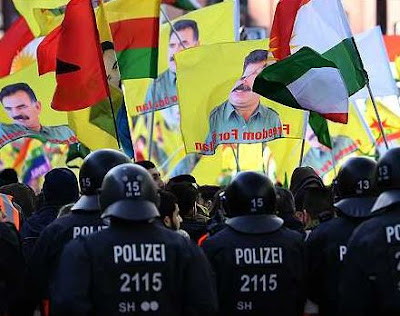Since the G20 in July of last year, the German state has moved to the right at an ever-more rapid and frightening pace. From the massive police repression, increased surveillance, attacks on left platforms and locations, and imprisonment of leftist protestors, the actions of the Grand Coalition (GroKo) government (comprised of the Orban-aligned CDU/CSU and Social Democratic SPD) have evoked many eerie memories of the first Grand Coalition, a government in office during the events of 1967-68 which enacted various oppressive measures, leading to the creation of the Extra-Parliamentary left opposing the two parties comprising 95 percent of the Bundestag.
The 1966 grand coalition was formed amid an environment of left-wing protest and rebellion in West Germany and the world. Students were gassed and even shot protesting right-wing Arab leaders allied to the German government, especially the Shah of Iran, while the tabloid media (mostly the Springer Press) heaped praise on the Israeli government's illegal wars in Syria and Palestine. Meanwhile, the recently founded neo-Nazi National Democratic Party was surging in state government and even federal polls.
Attempting to clamp down on the left-wing rebellions while keeping a lid on the open Nazis, the retired Nazis making up the GroKo passed "Emergency Acts" that cracked down on "anti-constitutional" actions and allowed for the state to suspend civil liberties in the case of an uprising by "anti-constitutionalists" (read: the left). These acts exist to this day and form the ideological basis of constitution-worship that classifies communists and anarchists as "extremists" liable for state repression. These dubious categories were used to justify the recent banning of the Indymedia Linksunten website, as well as symbols of the website and of the PKK and YPJ.
In addition, the right-wing Springer media empire, led by the notorious BILD, repeatedly incited violence against left wing protestors, students, and young people. These hysterical cries eventually led to the shooting of Rudi Dutschke, the leader of the German student movement. These media threats have been revived after the G20, with BILD doxxing Blockupy and Antifa protestors who were present during the anti-summit actions.
Many critics on the left believed that the West German government was falling into fascism, with some, like Ulrike Meinhof, Andreas Baader, and Gudrun Ensslin eventually forming urban guerilla groups to oppose the fascist creep. The threat of a new Nazism was dispelled to an extent by the successful cultural revolution of the left on issues such as sexuality and social liberties, as well as the embarrassing results of fascist coups or coup attempts in Greece and Italy.
The left today, however, exists in an even more dire context. The SPD has accepted neoliberal deficit-hawk policies, and the leader of today's JUSOS, Kevin Kühnert, is as close in politics to Rudi Dutschke as SPD leader Andrea Nahles is to Rosa Luxemburg. Meanwhile, close to 15 percent of Germans back the outright fascist Alternative For Germany party, which is more popular than both the increasingly right-wing Greens and Die Linke, which has adopted strains of Antideutsch ideology, the bankruptcy of which is obvious following yesterday's Israeli massacre of close to 60 Palestinians.
Amid this backdrop, the Bavarian CSU, a partner with Kühnert's "socialist" parent party SPD in the national government, has pursued a far-reaching law giving police extensive new powers described by left-wing protestors and even Die Linke as "Gestapo-like." According to the leftist daily Junge Welt (Young World), the law says that even leftist protestors posing "impeding," rather than "concrete" threats to "democracy" can have their letters, packages, and digital communications seized and monitored by police and the intelligence agencies. The paper adds: "Mind you: whether "concrete" or "threatening", in both cases no crime has to have taken place," and notes that, historically, "Bavaria is the battering ram to push through repression in the nation as a whole."
Refugees have also been under attack by police, state governments, and political parties, egged on by the mainstream media. Last week, 50 refugees in a Baden-Württemberg shelter protested the deportation of a young comrade, and the squat was subsequently brutally raided by riot police and special forces at daybreak. These actions were praised even in the more liberal newspapers and media outlets, and outright glorified by more right-wing publications.
Protestors from the Hambach Forest to Rojava to Palestine to the G20 have faced massive repression, including informants posing as ecologists in jails, withholding of letters, internet censorship, private corporate mercenaries, and, most worryingly, the creation of an international biometric and surveillance database of "Euro Anarchists" and "left-wing extremists." All of this has been accompanied with a more militarist foreign policy, including the opening of a new NATO base, arms shipments to the fascist government of Erdogan in Turkey, and a well-attended Munich Security Conference which was host to a verity of bellicose threats by Benjamin Netanyahu as well as Herbert McMaster, then head of the US war machine.
Finally, right-wing politicians, intellectuals, and media enterprises are declaring 2018 to be an "anti-68" that will, in their eyes, hopefully usher in a "conservative revolution." This term has historically been used by Nazis and far-right politicians in the Weimar Republic, along with others like "Leitkultur," which has now been adopted even by elements of the SPD. Most egregiously, a CSU politician, in a meeting with Viktor Orban (who just last week declared the "end of liberal democracy" in Hungary) called for a "final solution to the refugee question."
The politician, Manfred Weber, has since claimed that his statement was a "mistake." This may very well be the case. But taken as part of the larger trends in German society, it is definitely an ominous one.






